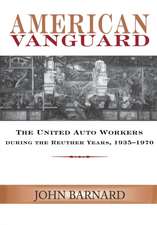Labour Unions, Public Policy and Economic Growth
Autor Tapio Palokangasen Limba Engleză Paperback – 19 mai 2010
| Toate formatele și edițiile | Preț | Express |
|---|---|---|
| Paperback (1) | 284.39 lei 6-8 săpt. | |
| Cambridge University Press – 19 mai 2010 | 284.39 lei 6-8 săpt. | |
| Hardback (1) | 503.18 lei 6-8 săpt. | |
| Cambridge University Press – 12 ian 2000 | 503.18 lei 6-8 săpt. |
Preț: 284.39 lei
Nou
Puncte Express: 427
Preț estimativ în valută:
54.42€ • 56.93$ • 45.21£
54.42€ • 56.93$ • 45.21£
Carte tipărită la comandă
Livrare economică 03-17 aprilie
Preluare comenzi: 021 569.72.76
Specificații
ISBN-13: 9780521144056
ISBN-10: 0521144051
Pagini: 252
Dimensiuni: 152 x 229 x 15 mm
Greutate: 0.37 kg
Editura: Cambridge University Press
Colecția Cambridge University Press
Locul publicării:Cambridge, United Kingdom
ISBN-10: 0521144051
Pagini: 252
Dimensiuni: 152 x 229 x 15 mm
Greutate: 0.37 kg
Editura: Cambridge University Press
Colecția Cambridge University Press
Locul publicării:Cambridge, United Kingdom
Cuprins
List of figures; Preface; Overview; 1. Basic concept of game theory; 2. Collective bargaining without investment; 3. The use of corrective taxes and subsidies; 4. Taxation and production efficiency; 5. Credibility in collective bargaining; 6. Monopoly unions and sluggish investment; 7. Ordinary wages verses profit-sharing; 8. Unions and economic growth; 9. Unions and international specialization; References; Index.
Descriere
A theoretical model of union bargaining, challenging the view that collective bargaining always has a negative impact on welfare.















